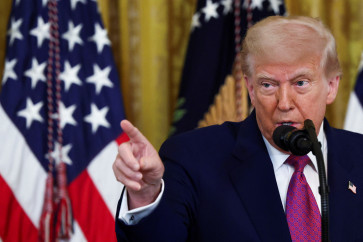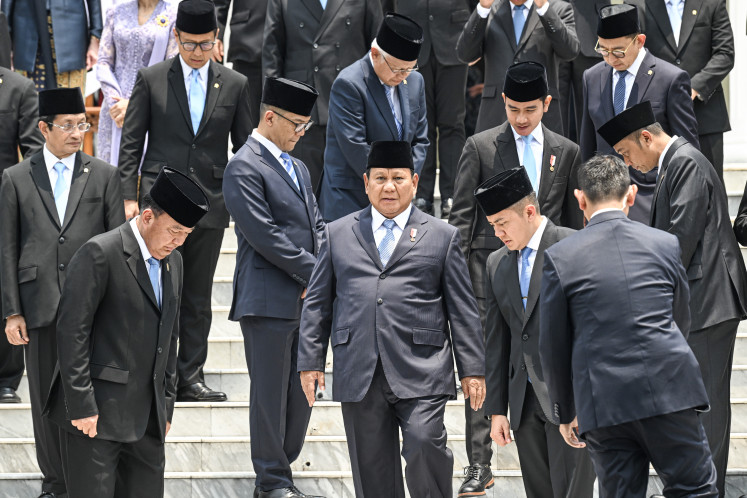Popular Reads
Top Results
Can't find what you're looking for?
View all search resultsPopular Reads
Top Results
Can't find what you're looking for?
View all search resultsOVO to tap into SME market with QR code technology
Customers of digital financial services firm Visionet Internasional (OVO) will soon be able to pay for goods and services from small and medium-sized businesses using the quick response (QR) code payment method, an initiative to widen the company’s user base amid increasing non-cash transactions
Change text size
Gift Premium Articles
to Anyone
C
ustomers of digital financial services firm Visionet Internasional (OVO) will soon be able to pay for goods and services from small and medium-sized businesses using the quick response (QR) code payment method, an initiative to widen the company’s user base amid increasing non-cash transactions.
The online payment app, part of diversified conglomerate Lippo Group, was preparing to launch the cashless feature for warungs (traditional food stalls) and restaurants within one or two months, said president director Adrian Suherman.
With the QR code method, Adrian said OVO customers could pay for food at stalls using the money they had deposited in their OVO electronic wallets.
Adrian said the technology would benefit both vendors and buyers because it facilitated transactions.
“The target for the QR code system is especially small merchants. For example, porridge sellers who cannot use [our existing] point-of-sales [POS] system, but [they can use] a QR code instead,” he said in Jakarta recently.
The POS system is an integrated computerized network that enables business transactions to be done via debit or credit card payment. A QR code, meanwhile, is a type of barcode that can be scanned using a smartphone with a built-in camera.
“The central bank has standardized [QR codes]. We will always obey the regulation,” Adrian said, when asked about the security features of QR codes.
Bank Indonesia (BI), which also supervises payment systems, recently issued BI Regulation No. 20/2018 on electronic money, which also includes the standardization of the QR code payment method.
According to a survey by Visa Worldwide on Indonesia’s consumer behavior, 76 percent of Indonesian respondents were ready to go fully cashless for a day.
Some 85 percent of Indonesians carried out various transactions, such as shopping and ordering food, only through their smartphones.
Meanwhile, only half of the 57 percent of respondents who were familiar with QR code payment were interested in using it.
OVO has officially launched strategic partnerships with four companies in Indonesia, namely state-owned lender Bank Mandiri, ride-hailing application provider Grab Indonesia (Grab), publicly listed retailer Sumber Alfaria Trijaya (Alfamart) and mobile POS startup Moka.
From the partnerships, OVO expects to boost its number of users to 60 million this year, five to six-fold up from 10-12 million users to date, while teaming up with up to 350,000 merchants in 212 cities in Indonesia.
Speaking at an event recently, Ridzki Kramadibrata, managing director of Grab Indonesia, said the partnership with OVO would enable Grab to get a wider market base.
“We are happy that users can now top up their OVO wallets via their Grab drivers,” he said. “It’s an easy way to go cashless for our consumers and a great way for our drivers to get more income faster.”
The partnership with Alfamart also allows OVO app users to top up their electronic wallets in 14,000 retail outlets in Indonesia.
As for cooperation with startup financial technology firm Moka, OVO users can use its application to buy products from Moka’s partners, of which there are over 10,000.
After its launch in March 2017, OVO obtained a digital payment operation license from BI within five months.
Through its mobile app, OVO offers promotions, cashback and reward points for customers when buying food in certain restaurants and popcorn at cinemas as well as paying parking tickets in several shopping malls.
Meanwhile, payment app Go-Pay, developed by homegrown ride-hailing company Go-Jek, is one of OVO’s biggest competitors. Go-Jek has already begun providing QR code technology to its merchants.
The ride-hailing app company is now expanding its digital payment services with the acquisition of online payment gateway Midtrans, savings and lending network Mapan as well as offline payment processing company Kartuku. (sau)










